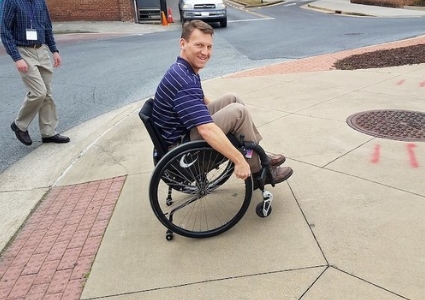Pledging
These are the original issues in this subcategory

You May Pledge Your Support For This Issue With A Monetary
Donation And By Writing A Letter To Your Representatives
- WORKERS WITH DISABILITIES
- REHABILITATION
- AMERICANS WITH DISABILITIES ACT

The 1990 Americans with Disability Act (ADA) is a broad civil rights law that prohibits discrimination based on one’s disability. It provides protections against discrimination for Americans with disabilities in much the same way as the 1964 Civil Rights Act prohibited discrimination against race, religion, natural origin and gender. A disability is defined as a physical or mental impairment that substantially limits at least one major life activity. These activities include seeing, walking, sitting, lifting, breathing, learning, working and many more. It is estimated that 20% of all Americans have at least one diagnosed physical or psychological disability, and there are more than 40 million Americans who are disabled today.
One of the main reasons for the ADA is to insure access and accommodations for Americans with disabilities in places of work. Advocates say removing the barriers to employment, transportation, public accommodations and services enable people who are disabled to better contribute to society, benefiting us all. Most of the opposition to the ADA comes from businesses, churches and other public places that require physical modification of their facilities. ADA critics say we’ve gone overboard on some of these regulations. They claim unscrupulous attorneys often file lawsuits against property owners before giving them an opportunity to respond or correct problems related to limited access to their facilities.
Pending Legislation: H.R.77 - ACCESS Act
Sponsor: Rep. Ken Calvert (CA)
Status: House Subcommittee on Crime, Terrorism, and Homeland Security (Judiciary)
Chair: Rep. Sheila Jackson Lee (TX)
Tweet
One of the main reasons for the ADA is to insure access and accommodations for Americans with disabilities in places of work. Advocates say removing the barriers to employment, transportation, public accommodations and services enable people who are disabled to better contribute to society, benefiting us all. Most of the opposition to the ADA comes from businesses, churches and other public places that require physical modification of their facilities. ADA critics say we’ve gone overboard on some of these regulations. They claim unscrupulous attorneys often file lawsuits against property owners before giving them an opportunity to respond or correct problems related to limited access to their facilities.
Pending Legislation: H.R.77 - ACCESS Act
Sponsor: Rep. Ken Calvert (CA)
Status: House Subcommittee on Crime, Terrorism, and Homeland Security (Judiciary)
Chair: Rep. Sheila Jackson Lee (TX)
Tweet
- I oppose reforming current Americans with Disabilities Act policy and wish to donate resources to the campaign committee of Speaker Nancy Pelosi (CA).
- I support access to public accommodations for persons with a disability by: 1.) Requiring the Department of Justice (DOJ) to develop a program to educate state and local governments and property owners on strategies for promoting access to public accommodations for persons with a disability. 2.) Authorizing an aggrieved person, after taking specified actions, to commence a civil action based on the failure to remove an architectural barrier to access an existing public accommodation. Specifically, the aggrieved person must have provided the owners or operators a written notice specific enough to identify the barrier and specify the circumstances under which public accommodation access was denied. The owners or operators must have (a.) failed to provide the person a written description outlining improvements that will be made to improve the barrier, or (b.) failed to remove the barrier or make substantial progress after providing such a description. 3.) Requiring the Judicial Conference of the United States to develop a model program to promote alternative dispute resolution mechanisms to resolve claims involving architectural barriers to access for public accommodations. And wish to donate resources to the campaign committee of Rep. Shelia Jackson Lee (TX) and/or to an advocate group currently working with this issue.
- I support access to public accommodations for persons with a disability by:
1.) Requiring the Department of Justice (DOJ) to develop a program to educate state and local governments and property owners on strategies for promoting access to public accommodations for persons with a disability.
2.) Authorizing an aggrieved person, after taking specified actions, to commence a civil action based on the failure to remove an architectural barrier to access an existing public accommodation. Specifically, the aggrieved person must have provided the owners or operators a written notice specific enough to identify the barrier and specify the circumstances under which public accommodation access was denied. The owners or operators must have (a.) failed to provide the person a written description outlining improvements that will be made to improve the barrier, or (b.) failed to remove the barrier or make substantial progress after providing such a description.
3.) Requiring the Judicial Conference of the United States to develop a model program to promote alternative dispute resolution mechanisms to resolve claims involving architectural barriers to access for public accommodations.
And wish to donate resources to the campaign committee of Rep. Shelia Jackson Lee (TX) and/or to an advocate group currently working with this issue.
Donation And By Writing A Letter To Your Representatives
Please login to pledge
Pledge Period - Opening Date
June 14, 2021
Pledge Period - Closing Date
June 20, 2021
Trustee Election - Begins
June 21, 2021
Suggest a worthy trustee for consideration before Day 16 of this presentation cycle. (Maximum 60 Characters)